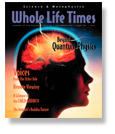 he remote viewing (RV) community is a small
segment of the Whole Life spectrum that is is
getting spectacular results and not a lot
of recognition. If I had to thumb-nail profile this
community, it would fall in the left brain, academic,
scientific, result-oriented, intelligence-gathering
side of the spectrum. he remote viewing (RV) community is a small
segment of the Whole Life spectrum that is is
getting spectacular results and not a lot
of recognition. If I had to thumb-nail profile this
community, it would fall in the left brain, academic,
scientific, result-oriented, intelligence-gathering
side of the spectrum.
The term "remote viewing" was coined by Ingo Swann
and his colleagues at Stanford Research Institute (SRI).
The remote viewing process was developed under
contract to the U.S. Government to adapt and apply
a specific psychic phenomena to intelligence collection,
and Swann was the key trainer for that research. In
the fall of 1996, The CIA declassified the so-called
"Star-gate" program, and for the first time, Americans
heard startling official confirmation that their government
had for a quarter century, trained and used psychic
spies. Using remote viewing, government personnel
had observed targets in the Soviet Union and
elsewhere, obtaining intelligence unavailable through
any other means. The current RV movement
grew out of this government program, and many
of the best-known and practicing viewers today
are ex-military personnel. A number have formed
private firms that cater to corporate and private
interests.
An illustrious group of representatives from
the RV community assembled for a conference
in Mesquite, NV last May.
The Godfather of remote viewing, Russel Targ
was a keynote speaker. Targ is an eloquent
spokesperson for the scientific and spiritual
implications of psychic abilities. He delivers
a strong case for spiritual unfoldment within
the scientific model. Targ's books, Mind Reach
written with Hal Putoff, and The Mind Race written
with Keith Harary, signaled the start of the RV
community as we know it today.
Articulate as Targ is, one would have to
say that
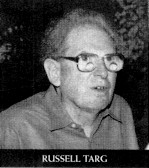 remote viewing has been popularized
by Ed Dames, whose numerous appearances
on the Art Bell Show helped to galvanize
intense public interest. But Dames came
in for a harsh round of criticism at the
conference for some ultimately erroneous
predictions broadcast over the radio.
There is a concern that such perceived
irresponsibility detracts from the credibility
of the work.
remote viewing has been popularized
by Ed Dames, whose numerous appearances
on the Art Bell Show helped to galvanize
intense public interest. But Dames came
in for a harsh round of criticism at the
conference for some ultimately erroneous
predictions broadcast over the radio.
There is a concern that such perceived
irresponsibility detracts from the credibility
of the work.
Some might question whether remote viewing
is a plausible enough field to warrant
an entire conference. Conference
organizer Paul H. Smith, a high-energy,
retired Air Force major, assured me
that although remote viewing doesn't
work all the time, 'practiced, experienced
viewers can access a target nearly
100% of the time. This doesn't
mean they get all the data they
were looking for. All it means is that
they retrieve information indicating
that they were 'there.' However,
these experienced viewers regularly
obtain extremely accurate, often
error-free information from the target."
President and chief instructor for
"Remote Viewing Instructional
Services, Inc., an Austin, Texas based
company providing training
and operational support for
remote viewing, Smith was for
seven years a government remote
viewer working for the U.S. army
and the Defense Intelligence Agency.
He was the chief coordinate remote
viewing (CRV) theory instructor
for the government program,
and primary author of the government
CRV manual. He performed hundreds
of operational remote viewing sessions
as a government RV'er.
Smith described for us exactly what
remote viewing is..and is not:
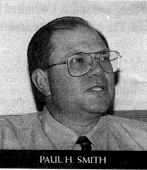 "Remote viewing (RV) is a skill
by which a 'viewer' can perceive
objects, persons, or events at
a location removed by either
space or time. In other words, one
does not actually have to be
there or need any physical
connections, such as television,
telephone, and so on to gain
information about the target.
RV exploits and improves upon
what is more commonly called
'psychic' ability, and works whether
the target is in the next room
or on the other side of the planet.
Neither time nor any known type
of shielding can prevent a
properly-trained remote viewer
from gaining access to the
desired target.
"Remote viewing (RV) is a skill
by which a 'viewer' can perceive
objects, persons, or events at
a location removed by either
space or time. In other words, one
does not actually have to be
there or need any physical
connections, such as television,
telephone, and so on to gain
information about the target.
RV exploits and improves upon
what is more commonly called
'psychic' ability, and works whether
the target is in the next room
or on the other side of the planet.
Neither time nor any known type
of shielding can prevent a
properly-trained remote viewer
from gaining access to the
desired target.
"Remote viewing is not 'being
psychic' as commonly understood
by the media and many practitioners
of paranormal arts. Remote viewers
are not typical clairvoyants, fortune
tellers or psychics. Although many of
the more traditional psychics have
amazing abilities, there is a qualitative
difference between the average 'natural'
psychic, and a properly trained remote
viewer.
One of the wonderful things about
RV is that virtually anyone can learn
to do it. Much like studying a musical
instrument or learning to draw, nearly
all of us have the capability to acquire
the techniques and put them into practice.
There are those who might not believe
this. You often hear people say
they can't learn to play the piano
or draw a straight line --- or to remote
view - because they don't have 'the talent.'
But what really gets in the way is nearly
always a simple lack of time, motivation,
or energy to devote to learning the
principles and then practicing enough
to become proficient.
"Unless there is some sort of physical
or mental handicap that prevents it, almost
anyone can learn to play piano at
least competently, can learn
to draw aesthetically, and can learn
to remote view reasonably effectively.
It just takes desire, time, the
right teacher, and the belief
that it is at least possible.
"Even novice viewers may surprise
themselves at the accuracy of
some of their sessions. Though
we anticipate beginners will
perform less consistently than those
who are more accomplished, we also
expect them to frequently turn out
commendable results."
Civilian Application of RV
The RV technique is finding its own
useful niche outside of governement
work. Lyn Buchannan has created
a private company that works in
the civilian domain in the recovery of
missing people. Lyn explained
that remote viewing has a long
history of finding hostages,
including the famous General
Dozier incident, his company is
now using it for police work
with good success.
Buchannan is unclear as to
the ideal role of remote viewing
in our society.
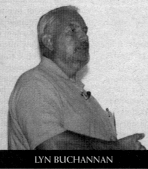 He explained that,
"We are still in the process of working
that out. We have stock brokers using
it, doctors using it for medical
diagnostics, police using it for
drug investigation and a multitude
of other purposes. To my surprise,
real estate salesmen have found it
of tremendous benefit when it comes to
selling houses and matching the
right house up to the buyer.
"We are going to be doing research
into scientific Research and
Development uses, like archeology.
Many new and interesting applications
are cropping up."
He explained that,
"We are still in the process of working
that out. We have stock brokers using
it, doctors using it for medical
diagnostics, police using it for
drug investigation and a multitude
of other purposes. To my surprise,
real estate salesmen have found it
of tremendous benefit when it comes to
selling houses and matching the
right house up to the buyer.
"We are going to be doing research
into scientific Research and
Development uses, like archeology.
Many new and interesting applications
are cropping up."
Buchannan's company does CRV
work for companies and sometimes
individuals, and trains and educates
people about CRV. He also has
a public service arm called the
Assigned Witness Program.
"The name came about one day
when I was talking to a police
department investigator who told me
what they really needed for this
case was a witness. 'I can assign
one,' I said."
Marty Rosenblatt is attempting to develop
a cadre of people over the internet who are interested
in sharpening their intuitive skills
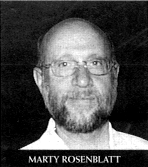 and putting them to use in such
practical arenas as the stock market.
Rosenblatt believes intuition can
be trained. His program for using
such skills to work the stock market,
MISTIE {Minute Stock-simulator for
Training and Intuition Exploration},
incorporates the AVM Project, which
employs an animal, vegetable or mineral
target/photo that is randomly chosen
after you enter your stock market
prediction.
and putting them to use in such
practical arenas as the stock market.
Rosenblatt believes intuition can
be trained. His program for using
such skills to work the stock market,
MISTIE {Minute Stock-simulator for
Training and Intuition Exploration},
incorporates the AVM Project, which
employs an animal, vegetable or mineral
target/photo that is randomly chosen
after you enter your stock market
prediction.
|
|
The AVM photograph
is then randomly "associated" with
future changes in the stock market
in a practical, online application.
The AVM Project is designed to
measure and improve your ability
to predict your financial future.
"Precognition comes from a deep
spiritual place where all of time,
space, energy, people, information,
and everything else remain mysteriously
and magnificently connected."
Rosenblatt said, "The fact that we
experience a separation from the
state of Oneness is the first sign
of individual consciousness. Intuition
is the 'language' or 'link' connecting
individual consciousness with the
spiritual reality of wholeness."
Jack Houck, possibly the best-known
person in this field, has developed an
array of techniques --- metal bending, RV,
and psychokinesis (PK), or mind-over-matter -
that allow people to access the mental access
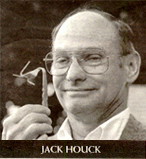 window (MAW} through which RV
and other psychic activity take place.
Houck told me that of the 15,000 people
who have been to his PK workshops,
approximately 85% have experienced
some level of PK. He feels that the
primary application for such work
is in the area of healing, with the
additional benefits of improving self-confidence
and learning how to achieve goals. Houck
sees PK as "real proof of the power
of positive thinking."
window (MAW} through which RV
and other psychic activity take place.
Houck told me that of the 15,000 people
who have been to his PK workshops,
approximately 85% have experienced
some level of PK. He feels that the
primary application for such work
is in the area of healing, with the
additional benefits of improving self-confidence
and learning how to achieve goals. Houck
sees PK as "real proof of the power
of positive thinking."
Lest anyone have a concern that the
process is difficult or uncomfortable,
Houck describes his workshops as PK
parties, because in the process of bending
spoons, everyone has a wild and fun
time. His next evening party
will be at the Learning Light Foundation
in Anaheim in October.
Joni Dourif, President of PSI TECH,
was asked to commercialize RV for the
civilian sector in the early 1990's.
 Dourif has no doubt that the "average
person" can learn RV techniques.
The PSI TECH TRV video-training
tapes she produced along with Major
Ed Dames teach Technical Remote
Viewing (TRV), an advanced
version of the original military
unit's protocols, coordinate remote
viewing (CRV). "TRV is a skill,"
Dourif explained, and like any
skill, if one applies rigor and
disciplined practice, one has a
higher probability of success.
When asked about the controversial
Dames, Dourif replied simply that
"Ed has retired."
Dourif has no doubt that the "average
person" can learn RV techniques.
The PSI TECH TRV video-training
tapes she produced along with Major
Ed Dames teach Technical Remote
Viewing (TRV), an advanced
version of the original military
unit's protocols, coordinate remote
viewing (CRV). "TRV is a skill,"
Dourif explained, and like any
skill, if one applies rigor and
disciplined practice, one has a
higher probability of success.
When asked about the controversial
Dames, Dourif replied simply that
"Ed has retired."
Joe McMoneagle of the Monroe Institute,
author of Mind Trek, also was
a participant in the US government's
remote viewing program. Mind Tek
is a nuts-and-bolts approach to
an ability the author considers to
be inherent in us all. McMoneagle's
book reveals no CIA secrets, but
he does disclose the laboratory methods
employed during US government research
into the field, stressing protocols
that insure the veracity of results.
The case he makes for the reality
of remote viewing is strong. McMoneagle
takes a step beyond experiments
in the laboratory and what viewers
can find over the physical horizon,
exploring the implications of
a practiced RV ability that would
allow us to see into the distance
across time, into our past and into
our future.
Other Luminaries in the Field
Charles Tart, Ph.D., is a long-time
researcher in parapsychological
phenomena. Tart emphasizes the
repeatability of the RV phenomenon
and the fact that RV results tend
to not diminish over time.
Larry Dossey, M.D., is a physician
of internal medicine, formerly with
the Dallas Diagnostic Association
and former Chief of Staff of Medical
City Dallas Hospital. He served
as a battalion surgeon in Vietnam,
and is past president of the Isthmus
Institute of Dallas, an organization
dedicated to exploring the convergence
of science and religious thought.
John Alexander, Colonel US Army (ret.),
is the author of the recently published
Future War: Non-lethal Weapons in
Twenty-first Century Warfare, and of
The Warrior's Edge. In 1980, his seminal
article, "The New Mental Battlefield,"
which described how psychic warfare
might be employed on the battlefield,
was published in Military Review.
Alexander believes the secrecy that
has long been associated with RV has
been both a curse and blessing.
He suggests we look openly at ways
the phenomenon can be responsibly
applied, lessening the chance
of unwarranted claims by
charlatans.
Skip Atwater is the Lab Director
of the well-known Monroe Institute
of Applied Sciences that does
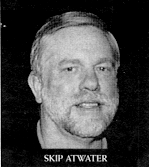 research into the out-of-body
experience. His background includes
a stint as the Operations and Training
Officer for the US Army Intelligence
remote viewing program.
research into the out-of-body
experience. His background includes
a stint as the Operations and Training
Officer for the US Army Intelligence
remote viewing program.
Stephen Schwartz, author of
The Alexandria Project, was one
of the first to use remote viewing
techniques to find lost
archeological sites. Conceptually,
Schwartz is convinced that RV out
to be a successful technique for
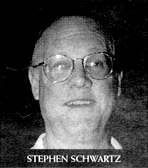 geologic search, but acknowledges
that is an extrapolation from research
in other areas, and that there hasn't
been enough research to reach a definitive
conclusion. This, however, does not
deter him.
geologic search, but acknowledges
that is an extrapolation from research
in other areas, and that there hasn't
been enough research to reach a definitive
conclusion. This, however, does not
deter him.
"One the basis of the evidence from
actual searches and excavations or
dives, remote viewing has proven to
be a highly useful technique for
the location and reconstruction
of archaeological sites," said Schwartz.
"It has shown that it can be
a better choice than traditional electronic
remote sensing technologies, although
I believe the optimal approach is
to use all available options. The
best thing about remote viewing
is that the best-case scenario using
electronic search techniques, is the
worst-case scenario using remote
viewing.
Greg Kolodziekzyk teaches
a mental technique that allows
anyone to utilize his or her intuitive
abilities in a controlled, goal-oriented
manner. He teaches how to apply
associative remote viewing (ARV)
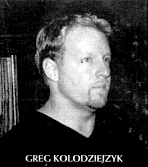 to make accurate predictions of
random future events. Greg has used
this mental technique for two years
to predict the outcome of various
random financial markets.
to make accurate predictions of
random future events. Greg has used
this mental technique for two years
to predict the outcome of various
random financial markets.
RV has developed considerably since
its initial inception, and its goals have
expanded dramatically. The remote
viewing community is now doing
serious research into an area I would
describe as "applied psychics." The
techniques are being used to bring
measurable results in everyday
life, as well as becoming a gateway
for expanded perception and
exploration of non-physical realities.
For information about the 2001 RV
conference in Mesquite, NV, e-mail
Rvconference@rviewer.com.
Paul Andrews is a WLT feature
writer specializing in leading-edge
human potential and deep history
topics.
|
